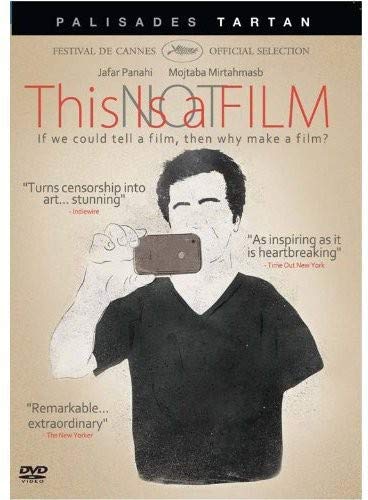
Jafar Panahi’s defiant, playful, mundane, formally adventurous and consistently surprising This is Not a Film is one of the greatest things I’ve seen this year, whether you want to call it a film or not. I’m delighted it’s been shortlisted for the best documentary Academy Award, even if calling it a documentary doesn’t seem quite right either. Like Panahi’s previous films and those of mentor Abbas Kiarostami, This is Not a Film obliquely explores political ramifications through commonplaces, all the while questioning the power of a cinematic image and dancing on the line between reality and fiction. Yes, it’s a masterpiece of protest cinema, made against government restriction and smuggled out of the country on a flash drive hidden in a cake, but it’s plenty more too.
The film opens with Panahi filming himself with his iPhone in his well-appointed apartment. He’s under house arrest by the Iranian government on charges of creating propaganda against the regime, and he’s waiting to hear the result of his appeal of a six-year prison sentence and a 20-year ban on making films. Unable to officially pursue his art, he tries to keep himself busy with phone calls to his lawyer, watching bits of some of his old films on DVD and tending to his daughter’s pet iguana.
When friend and fellow filmmaker Mojtaba Mirtahmasb arrives, he begins shooting Panahi with a consumer-grade digital camera, and Panahi sets to acting out an unproduced script, rejected by the censors and now unlikely to ever become a reality. Propelled by a visibly active imagination, Panahi moves with kinetic energy across his living room, setting the scene and explaining the characters with nary a single prop, set or actor. In this sketch, he reveals his true self — a maker of images no matter what obstacles the government puts in his way.
This is Not a Film offers a cerebral examination of what a film truly is, and its wry blurring of the lines between everyday activity and cinema is one of its most exciting elements. And yet, this is a fundamentally human tale, as emotionally fulfilling as any more traditional narrative film I’ve seen this year. The unspoken heartbreak of Panahi’s stifled purpose and the kernel of human connection he experiences with a garbage man in the film’s final sequence coalesce to give us a vivid personal portrait of a great artist, hobbled but in no way defeated.